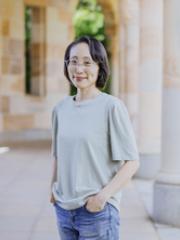Dr Min Jung Jee

Researcher biography
Background
I am Senior Lecturer and the Korean Major Convenor at the University of Queensland, with a PhD in Applied Linguistics specializing in Foreign Language Education from the University of Texas at Austin. My academic journey spans over two decades of language education across multiple contexts: I taught and coordinated English language programs in South Korea for 10 years, taught and coordinated Korean language courses at the University of Texas at Austin for 5 years, and have taught and coordinated Korean language courses at UQ since 2014. I was awarded Fellow rank from the Higher Education Academy in 2019, recognizing excellence in teaching and learning.
My research operates at the intersection of applied linguistics, psychology, and migration studies, with particular expertise in heritage language maintenance, immigrant acculturation, and affective factors in language learning. I conduct research on Korean diaspora communities, with a strong publication record and external funding support that demonstrates the international relevance of this work.
Current Research Focus
My research program examines three interconnected areas within applied linguistics and migration studies:
Heritage Language Maintenance and Identity: I investigate how immigrant communities maintain, shift, or lose their heritage languages across generations, exploring the complex relationships between language proficiency, ethnic identity, and cultural adaptation in multicultural societies.
Immigrant Acculturation and Psychological Adaptation: My research examines the psychological processes through which immigrants adapt to new cultural environments, investigating acculturation strategies, cultural identity formation, and their impact on mental health and wellbeing. This work contributes to understanding how language and cultural factors influence successful integration in diverse societies.
Affective Factors in Language Learning: I study the emotional and psychological dimensions of language acquisition, particularly anxiety, motivation, beliefs, and self-efficacy among diverse language learners including foreign/second language learners as well as heritage language learners and immigrants. This research addresses how affective factors influence language learning outcomes and daily communication experiences.
Future Research Directions
I am expanding my research framework to examine heritage language maintenance and acculturation processes among diverse minority communities in Australia, including Indigenous populations and other immigrant groups. This expansion will contribute to broader understanding of multilingualism, cultural identity, and social integration in contemporary Australia. I am particularly interested in developing national and international collaborations that employ trans-disciplinary approaches to address complex questions about language, identity, and belonging in multicultural societies. Additionally, I seek to further investigate affective factors in language learning across diverse contexts, examining how emotional and psychological dimensions influence language acquisition outcomes for different learner populations.
My research directly informs policy and practice in multicultural education, heritage language programs, and immigrant settlement services, contributing to evidence-based approaches that support linguistic diversity and cultural inclusion in Australian society.
